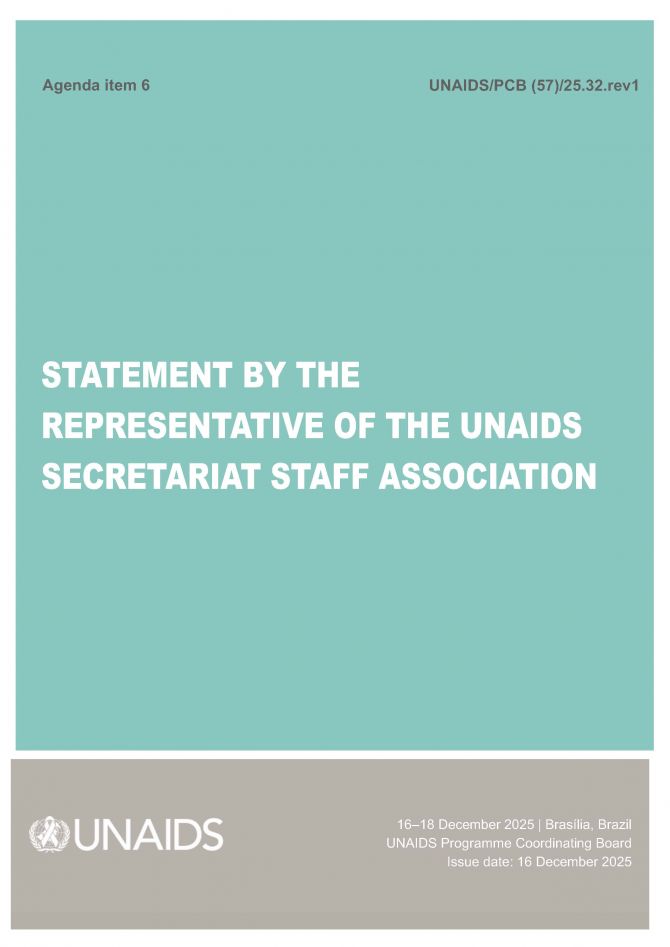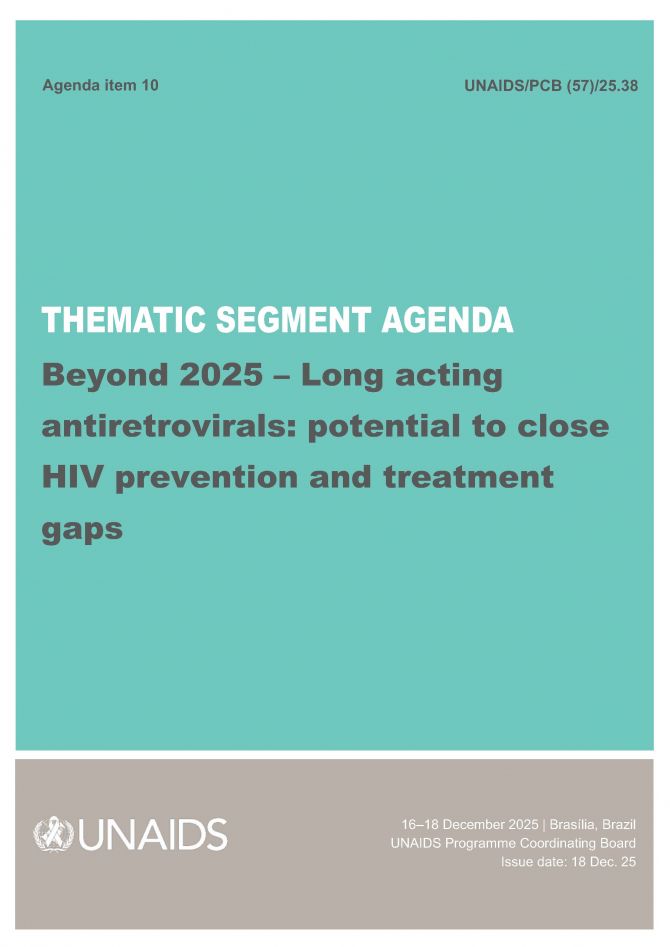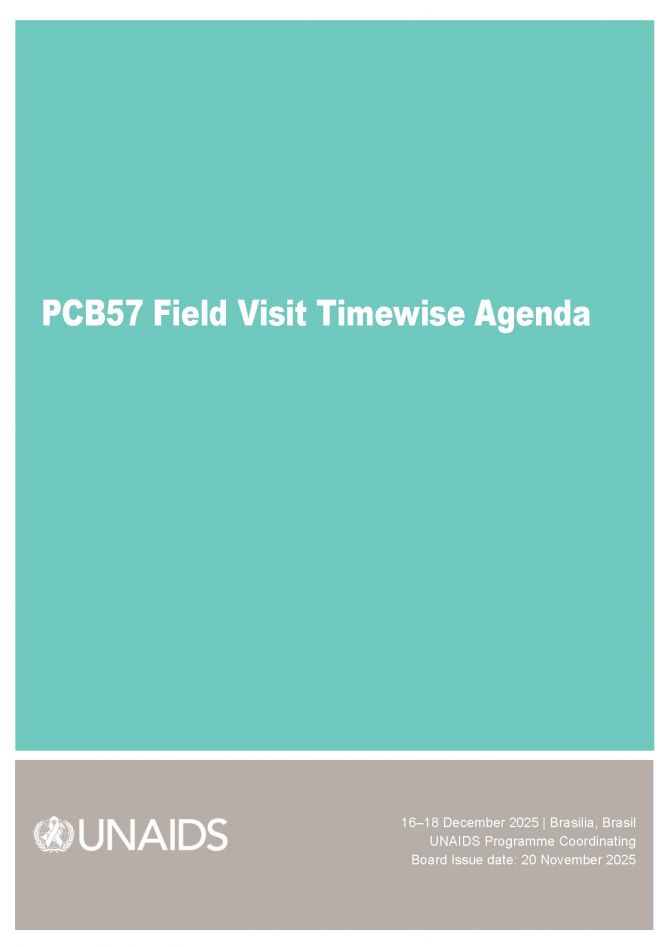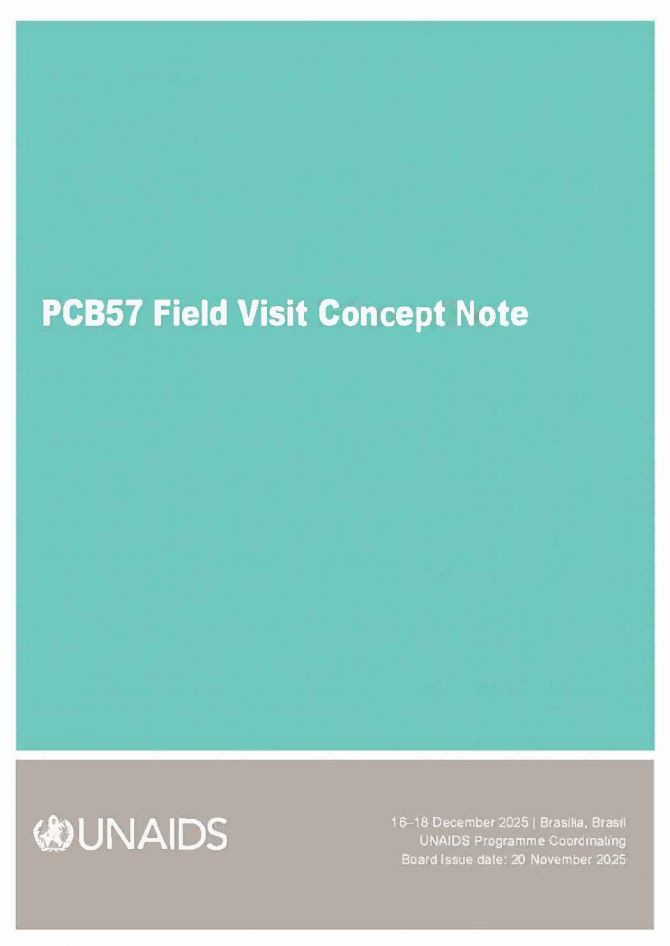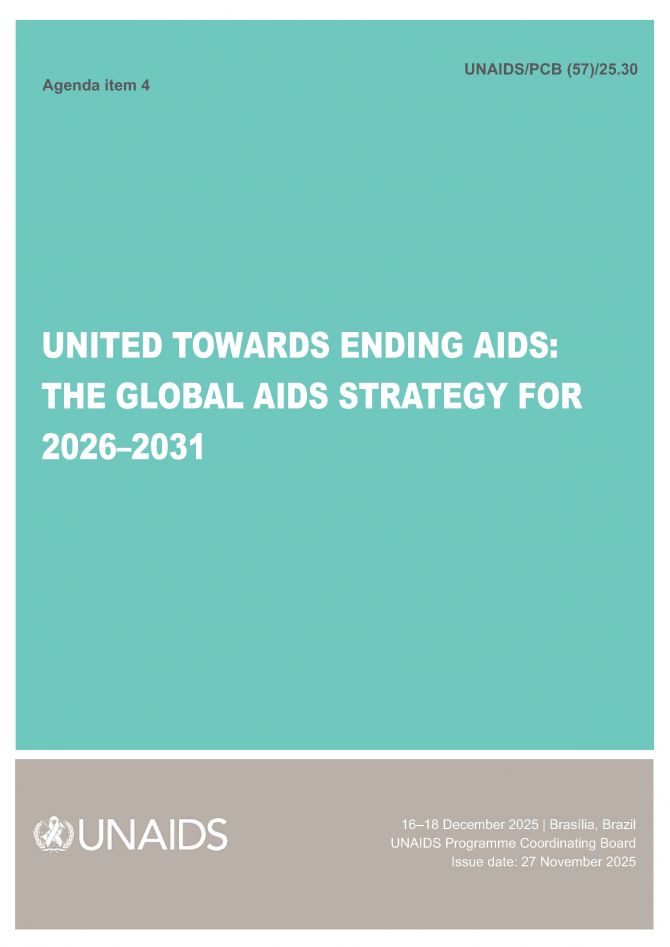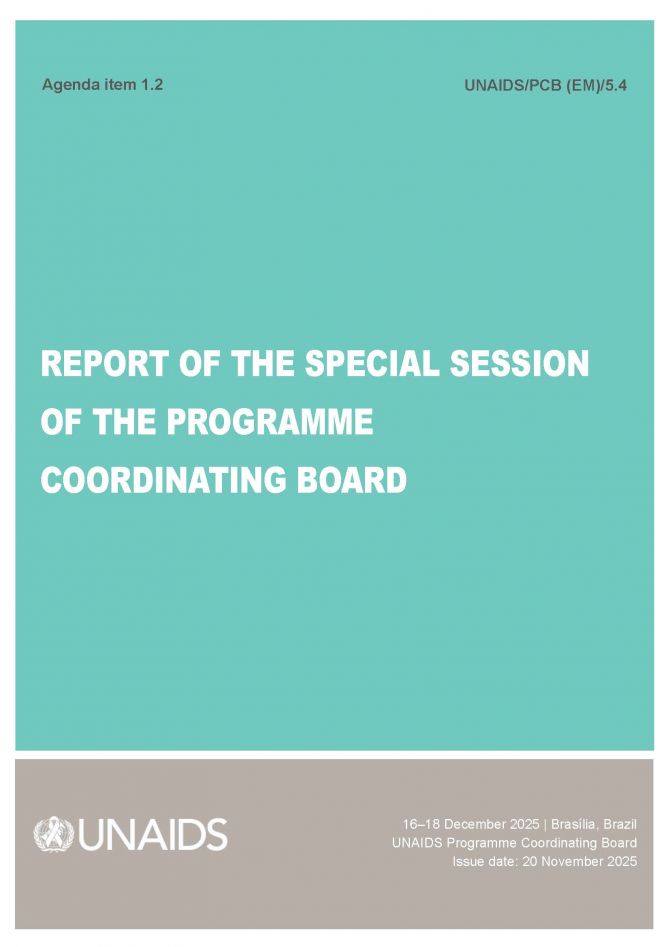
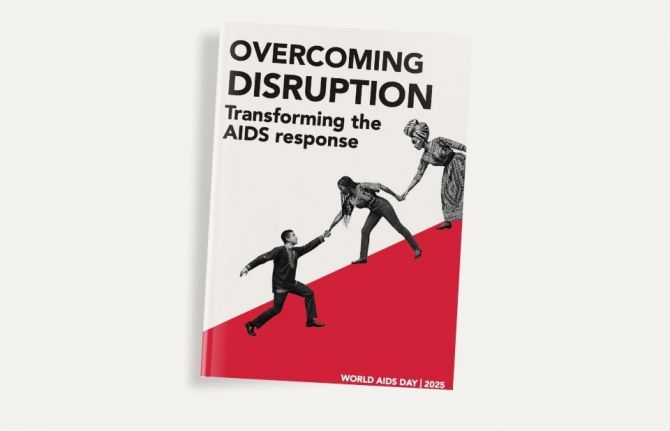
Media Advisory
Launch of UNAIDS World AIDS Day Report 2025
21 November 2025 21 November 2025Overcoming disruption, Transforming the AIDS response
This World AIDS Day comes at a moment of profound disruption and uncertainty for the global HIV response. The combination of a deepening funding crisis, growing geopolitical fragmentation, and questions around the future of global HIV coordination has created the most challenging landscape in more than two decades.
Ahead of World AIDS Day on which is commemorated annually on 1 December, UNAIDS is launching a new report on Tuesday 25 November highlighting the impact of the funding cuts and some of measures taken by countries and communities to continue to drive the response forward despite the disruptions.
The HIV response has always been a testament to what humanity can achieve when there is unity. To date, global collective actions have saved millions lives. This progress risks being lost. No country can fight HIV alone. Nine million people are living with HIV and not on treatment (of the 40.8 million) and 1.3 million people were newly infected with HIV in 2024.
WHAT: Press conference to launch the 2025 UNAIDS World AIDS Day report - Overcoming disruption, transforming the AIDS response.
WHEN: Tuesday 25 November, 14:00–14:45 CET / 13:00–13:45 GMT
SPEAKERS:
- Winnie Byanyima, Executive Director, UNAIDS
- Byrone Chingombe, Technical Director, Centre for Sexual Health and HIV/AIDS Research CeSHHAR (from Harare, Zimbabwe)
- Angeli Achrekar, Deputy Executive Director, UNAIDS
WHERE: Palais des Nations, Geneva, Press Conference room
EMBARGOED MATERIALS: Embargoed until 14:00 CET / 13:00 GMT – 25 November
PASSWORD PROTECTED SITE: URL: https://embargo.unaids.org/
Username: Un@ids_WAD
Password: WAD_r3port_2025
FOR INTERNATIONAL MEDIA WHO WOULD LIKE TO JOIN THE PRESS CONFERENCE REMOTELY PLEASE CONTACT:
Charlotte Sector | tel. +41 79 500 8617 | sectorc@unaids.org
Michael Hollingdale | tel. +41 79 500 2119 | hollingdalem@unaids.org
Related resources

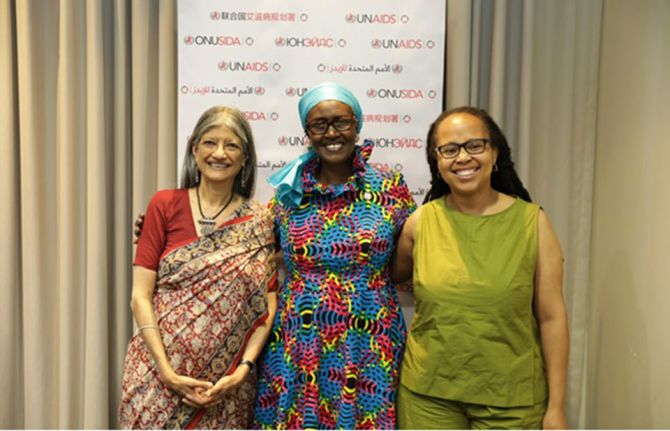


Press Release
UNAIDS executive director Winnie Byanyima addresses G20 Leaders’ summit in Johannesburg, warns that global inequalities are prolonging the AIDS crisis and other pandemics
21 November 2025 21 November 2025GENEVA/JOHANNESBURG, 21 November 2025— UNAIDS Executive Director and United Nations Under-Secretary-General Winnie Byanyima has warned G20 leaders that entrenched inequalities within and between countries are a threat to the whole world.
Noting that inequalities are prolonging the AIDS crisis and leaving the world vulnerable to future pandemics, she urged leaders to establish an International Panel on Inequality, which could support governments and multilateral agencies to develop national and international policies to address inequality.
“In a world pulled apart by extreme inequality, no one is safe,” said Ms Byanyima. “G20 leaders need to tackle the inequality emergency to build a safer world for all.”
Ms Byanyima will address the G20 Leaders’ Summit on 22 November in Johannesburg on behalf of the G20 Extraordinary Committee of Independent Experts on Global Inequality, commissioned by President Cyril Ramaphosa. The Committee, chaired by Nobel Economics Laureate Joseph Stiglitz, has called for the establishment of an International Panel on Inequality, inspired by the Intergovernmental Panel on Climate Change (IPCC). New analysis published by the Committee report shows that between 2000 and 2024, the world’s top 1% captured 41% of all new wealth, while just 1% went to the bottom 50%.
Amid steep cuts in donor funding for the global AIDS response, Ms Byanyima called on leaders to enable immediate action to address the unaffordable debt interest payments being paid by low- and middle-income countries, so that their governments can devote the resources that are needed to end AIDS and other pandemics. Developing countries are chokingon debt servicing, amounting to nearly $3 trillion. Servicing this debt deprives governments of revenues that are essential to fund investments in health systems and in the social determinants of health.
Ms Byanyima serves both as a member of the G20 Extraordinary Committee, and as the Convenor of the Global Council on Inequality, AIDS and Pandemics. Research released ahead of the G20 by each of the two expert groups demonstrates that persistent high inequality is a global emergency – stoking political instability, holding back the economy, and undermining public health.
Research by the Global Council shows that high levels of inequality, within and between countries, are making the world more vulnerable to pandemics, making pandemics more economically disruptive and deadly, and making them last longer; pandemics in turn exacerbate inequality, driving a cyclical, self-reinforcing relationship.
Evidence shows that more unequal countries have seen significantly higher COVID-19 mortality, higher rates of HIV infection, and higher AIDS mortality as they have struggled to mount effective pandemic responses.
Evidence also shows that social determinants of pandemics generate underlying vulnerability. In Brazil, for example, people without basic education were several times more likely to die from COVID-19 than those completing elementary school. In England, living in overcrowded housing was linked to higher mortality rates from COVID-19.
The damaging impact of entrenched inequalities between countries was illustrated during the height of the COVID-19 pandemic: while high-income countries were able to finance surges in health spending and economic mitigation measures and roll out vaccines, low-income countries, by contrast, were held back by severe financial constraints and were also forced to wait for vaccines, which hampered the COVID-19 response worldwide.
Ms Byanyima praised South Africa’s leadership of the G20, focused on “Solidarity, Equality, Sustainability”, for advancing international progress on access to medicines, on debt and financing, and for its drive domestically for universal health coverage through National Health Insurance, stating that “President Ramaphosa is lighting the way to a world that is both fairer and safer.”
“The evidence,” said Ms Byanyima, “is unequivocal: first, that inequality is a danger to the world, and that reducing inequalities within and between countries will make everyone safer; second, that these inequalities can be overcome, if leaders act together. Inequality is not fate; it is a disastrous collective international policy choice that leaders can choose now to unmake.”
/ENDS
Notes for editors
UNAIDS Executive Director Winnie Byanyima was a leader of the report of the Global Council on Inequalities, AIDS and Pandemics, and of the report of the G20 Extraordinary Committee of Independent Experts on Global Wealth Inequality.
The Global Council on Inequality, AIDS and Pandemics is a high-level initiative convened by UNAIDS to confront how inequalities drive pandemics—and how pandemics, in turn, deepen inequality. Convened by Winnie Byanyima, the Council is co-chaired by Chairperson of the One Economy Foundation and Namibia’s former First Lady Monica Geingos, Director of the UCL Institute of Health Equity Professor Sir Michael Marmot, and Nobel laureate Joseph E. Stiglitz. It brings together leaders across economics, public health, human rights and finance to build a policy environment in which inequalities can be addressed so the world can end AIDS and better prepare for and respond to future pandemics.
The G20 Extraordinary Committee of Independent Experts on Global Inequality report, commissioned by President Ramaphosa as G20 President, is authored by the 2025 G20 Extraordinary Committee of Independent Experts on Global Inequality, led by Joseph E. Stiglitz, and joined by Adriana Abdenur, Winnie Byanyima, Jayati Ghosh, Imraan Valodia and Wanga Zembe-Mkabile.

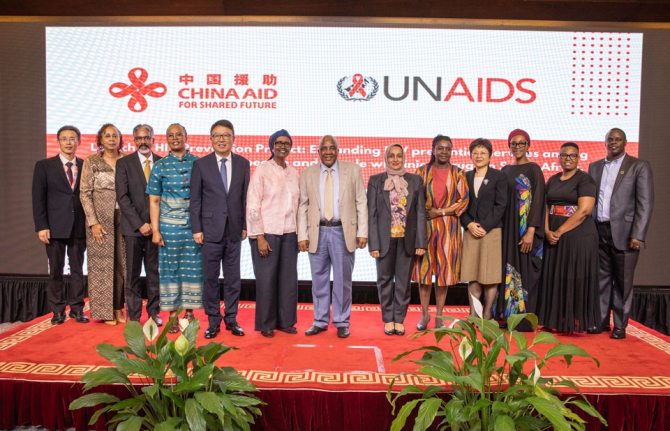
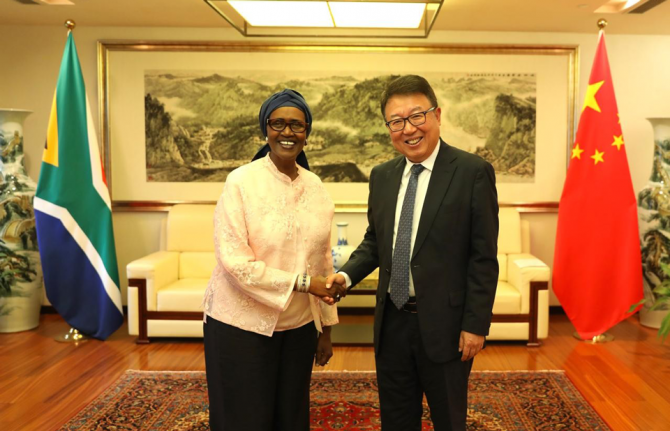
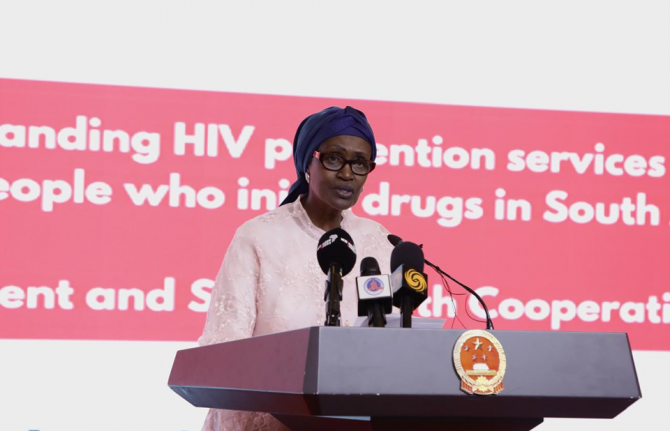
Press Release
People’s Republic of China unveils US$ 3.49 million HIV prevention support for South Africa, facilitated by UNAIDS
21 November 2025 21 November 2025GENEVA/JOHANNESBURG, 20 November 2025—The People’s Republic of China, through the China Global Development and South-South Cooperation Fund, has announced a two-year US$ 3.49 million (approximately 60 million South African rand) funding partnership to expand HIV services across South Africa. The agreement, facilitated by UNAIDS, will boost South Africa’s efforts to end AIDS as a public health threat.
The agreement will go towards HIV prevention services, particularly focusing on young people and people who inject drugs as some of the groups at most risk of HIV infection. South Africa has the world's largest HIV epidemic with around 8 million people living with the virus. Young people aged 15-24 account for over a third of new infections and HIV prevalence among people who inject drugs is 7% higher than among the general population.
“Through this investment, the People’s Republic of China is working hand in hand with South Africa to stop new HIV infections echoing the themes of South Africa’s G20 Presidency: solidarity, equality and sustainability,” said Winnie Byanyima, Executive Director of UNAIDS. “It shows China’s commitment to multilateralism and advancing South-South cooperation, through sharing of technology, innovation, and grant funding in our pursuit of universal health coverage and the goal of ending AIDS by 2030.”
“This project, funded by the People’s Republic of China, is concrete action to implement the Global Development Initiative and jointly build a global community of health for all. We are honoured to deepen our longstanding partnership with South Africa through this grant to support the country’s HIV response,” said His Excellency, the Chinese Ambassador to South Africa, Wu Peng. “China stands firmly with South Africa as it strengthens its HIV prevention and treatment programmes. In addition to this project, we stand ready to assist South Africa in establishing a sustainable HIV/AIDS response system through policy dialogue, innovative drug supply, technology transfer, and capacity building. We remain dedicated to working together to build a healthier, more resilient future for our two nations,” he added.
The two-year funded project will reach 54 000 adolescents and young people in Technical and Vocational Education and Training colleges across seven provinces. It will also support 500 people who inject drugs through harm reduction and opioid agonist therapy programmes in Gauteng province.
“On behalf of the Government of South Africa, I extend our sincere appreciation to the Government of China for this vital support to our national HIV response,” said Dr. Aaron Motsoaledi, Minister of Health of South Africa. “This contribution strengthens our shared commitment to safeguarding the health and dignity of people living with and affected by HIV."
The initiative promotes South South collaboration between South Africa and China within the BRICS Framework and builds on shared experiences in addressing HIV among vulnerable populations. It also reinforces global solidarity and international cooperation and assistance, which has been the foundation of the global HIV response since the start of the pandemic.
“Today’s event is more than the unveiling of a project,” said Mmapaseka Steve Letsike, Deputy Minister in the Presidency for Women, Youth and Persons with Disabilities of South Africa. “It is a reaffirmation of our shared humanity and our shared responsibility to protect the health, dignity and futures of young people and key populations across South Africa. It is, ultimately, a statement that no one will be left behind.
The funding announcement follows the signing of a Memorandum of Understanding in July 2024 between UNAIDS and China’s International Development Cooperation Agency, formalizing cooperation on HIV, pandemics, and health. Today’s announcement is the first major grant mobilized through the partnership, supporting South Africa’s HIV response.
“We are at a critical moment in the global HIV response. This year has been marked by disruption. But we have the power to transform. In a new era for global health, China is accelerating transformation, fostering equity, and building self-reliance. This project will save lives and drive innovations that stop new HIV infections,” said Ms Byanyima.
UNAIDS will support the project in collaboration with the China International Centre for Economic and Technical Exchanges, the Government of South Africa through the Departments of Health, Higher Education and Training and Correctional Services, the United Nations Office on Drugs and Crime, the World Health Organization and Higher Health, a non-profit organization and implementing arm of the Department of Higher Education and Training.
UNAIDS
The Joint United Nations Programme on HIV/AIDS (UNAIDS) leads and inspires the world to achieve its shared vision of zero new HIV infections, zero discrimination and zero AIDS-related deaths. UNAIDS unites the efforts of 11 UN organizations—UNHCR, UNICEF, WFP, UNDP, UNFPA, UNODC, UN Women, ILO, UNESCO, WHO and the World Bank—and works closely with global and national partners towards ending the AIDS epidemic by 2030 as part of the Sustainable Development Goals. Learn more at unaids.org and connect with us on Facebook, Twitter, Instagram and YouTube.
Contact
UNAIDS South AfricaZeenat Abdool
tel. +27 827 788 080
abdoolz@unaids.org
UNAIDS Global Communications
Robert Shivambu
tel. +27 (0) 83 608 1498
shivambuh@unaids.org

